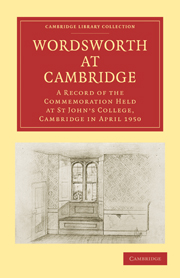 Wordsworth at Cambridge
Wordsworth at Cambridge Book contents
- Frontmatter
- Contents
- FRONTISPIECE
- The Wordsworth Centenary Celebrations
- The Master's Address: St John's College in Wordsworth's Time
- Reading and Commentary
- The Toast: “Wordsworth”, by the Master of Trinity College
- The Exhibition in the Library
- Additional Notes on St John's College in Wordsworth's Time
- Wordsworth's Ash Tree
- Wordsworth Portraits: A Biographical Catalogue
- ILLUSTRATIONS
The Toast: “Wordsworth”, by the Master of Trinity College
from The Wordsworth Centenary Celebrations
Published online by Cambridge University Press: 07 September 2010
- Frontmatter
- Contents
- FRONTISPIECE
- The Wordsworth Centenary Celebrations
- The Master's Address: St John's College in Wordsworth's Time
- Reading and Commentary
- The Toast: “Wordsworth”, by the Master of Trinity College
- The Exhibition in the Library
- Additional Notes on St John's College in Wordsworth's Time
- Wordsworth's Ash Tree
- Wordsworth Portraits: A Biographical Catalogue
- ILLUSTRATIONS
Summary
When I heard that the Master was to read us a paper in your beautiful Combination Room, on St John's in Wordsworth's undergraduate days, I felt sure we should hear something of historical interest and value. Nor have we been disappointed. The Master's knowledge, not only of the bygone customs of the College, but of so many of its personalities, both dons and undergraduates of that day, has been of great interest to us all.
And the second part of the programme both edified and entertained us. It is a great thing to be able to laugh at those you love, when you can do it as well as Lewis Carroll and J. K. S. The greatest Wordsworthian I ever knew well, Edward Grey of Fallodon, liked a joke about the bard. I remember his delight over Wordsworth's phrase “the solemn bleat” of a sheep. He said to me, “No one but downright old Daddy Wordsworth would ever have talked of a ‘solemn bleat’”.
It was with pride and pleasure that I received your invitation to propose this toast, on this occasion and in this place. I hope the historic rivalry of John's and Trinity will never cease. For four hundred years its fortunes have swayed to and fro, but John's never scored a bigger point (not even in the Boat Race against Oxford in 1950) than when, practically in one undergraduate generation, it produced three such men as Wilberforce, Castlereagh and Wordsworth, to say nothing of Palmerston a decade later.
- Type
- Chapter
- Information
- Wordsworth at CambridgeA Record of the Commemoration Held at St John's College, Cambridge in April 1950, pp. 21 - 27Publisher: Cambridge University PressPrint publication year: 2009First published in: 1950
